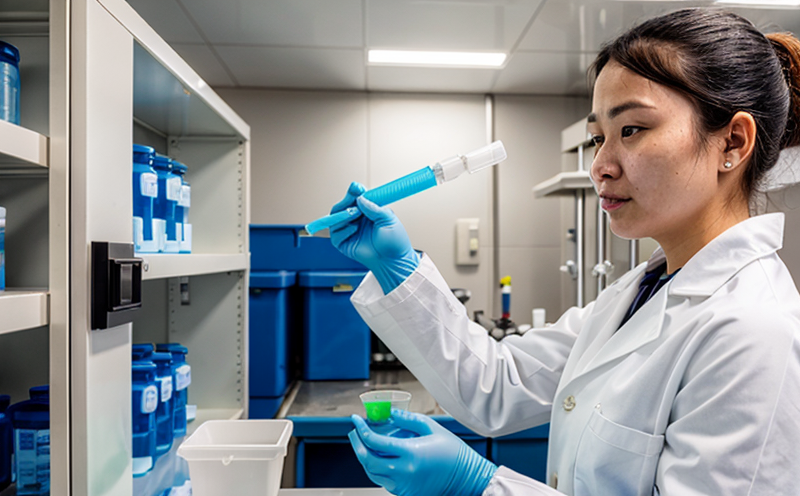USP Excipient Microbial Testing
The United States Pharmacopeia (USP) excipients are integral to pharmaceutical formulations as they provide essential properties that enhance the stability, safety, and efficacy of drug products. The USP Excipient Microbial Testing service ensures compliance with USP monographs by detecting potential contamination from microorganisms such as bacteria, fungi, and yeast in excipients used in the manufacturing process.
This testing is crucial for ensuring product quality and patient safety, particularly when excipients are used in oral, topical, or injectable formulations. Microbial contamination can lead to spoilage, reduced shelf life, and potential health hazards. The USP Excipient Microbial Testing service follows a multi-step process that includes sample preparation, inoculation with appropriate test organisms, incubation periods, and visual examination of growth.
Specifically, the testing procedure involves:
- Sampling excipients from various lots to ensure variability assessment.
- Inoculating samples with specified microorganisms such as E. coli, Saccharomyces cerevisiae, and Candida albicans.
- Incubating the samples in conditions that favor microbial growth.
- Observing colonies on selective media to identify potential contaminants.
The results are compared against USP guidelines, which define acceptable levels of contamination. This ensures that only excipients meeting strict standards are approved for use in pharmaceutical products.
Our laboratory employs advanced microbiological techniques and state-of-the-art equipment to perform these tests accurately and efficiently. Our expertise lies not just in executing the protocol but also in interpreting results within the context of product safety and efficacy. By adhering strictly to USP guidelines, we help our clients maintain regulatory compliance and build trust with their end-users.
Compliance with USP excipient microbial testing is particularly important for:
- Packaging materials.
- Solvents used in the manufacturing process.
- Coatings applied to tablets or capsules.
- Disintegrants aiding in tablet dissolution.
In addition, this testing is essential for ensuring that excipients do not interfere with drug efficacy and patient safety. The results of these tests are critical for regulatory submissions and help pharmaceutical companies meet stringent quality standards set by regulatory bodies like the FDA.
Why It Matters
The importance of USP excipient microbial testing cannot be overstated. Microbial contamination in excipients can have severe consequences, including:
- Potential for cross-contamination during manufacturing.
- Reduction in shelf life due to accelerated spoilage.
- Increased risk of adverse reactions if the excipient is ingested or applied topically.
The USP guidelines are designed to minimize these risks by setting stringent limits on microbial content. By adhering to these guidelines, pharmaceutical manufacturers can ensure that their products meet the highest standards of quality and safety.
Moreover, failure to comply with USP excipient microbial testing can result in:
- Product recalls due to contamination.
- Regulatory penalties for non-compliance.
- Loss of consumer confidence and brand reputation.
The stakes are high, but the rewards of thorough microbial testing are equally significant. By ensuring that excipients meet USP standards, pharmaceutical companies can:
- Guarantee product safety and efficacy.
- Avoid costly recalls and legal issues.
- Promote consumer trust and brand loyalty.
Industry Applications
USP excipient microbial testing is widely used across various sectors of the pharmaceutical industry. Here are some key applications:
- Packaging materials: Testing ensures that containers and closures do not introduce harmful microorganisms into the product.
- Solvents: Ensures purity in manufacturing processes, preventing contamination from solvents used in extraction or purification steps.
- Coatings: Guarantees that coatings applied to tablets or capsules do not contain harmful microorganisms.
- Disintegrants: Ensures that the disintegration process does not introduce microbial contamination into the final product.
In each case, the testing helps manufacturers ensure that excipients are free from contaminants and meet stringent quality standards. This is critical for maintaining compliance with regulatory requirements and ensuring patient safety.
Quality and Reliability Assurance
USP excipient microbial testing plays a vital role in the quality control processes of pharmaceutical manufacturers. By adhering to USP guidelines, companies can:
- Ensure product consistency: Consistent microbial content across batches helps maintain product uniformity and reliability.
- Promote regulatory compliance: Compliance with USP standards is a prerequisite for FDA approval and ensures that products meet international quality standards.
- Enhance patient safety: Reduced risk of microbial contamination leads to safer and more effective pharmaceuticals.
The testing process itself contributes significantly to these goals. By using advanced microbiological techniques, our laboratory ensures accurate and reliable results. Our team of experts interprets these results within the context of product safety and efficacy, providing actionable insights that help our clients make informed decisions.
Our commitment to quality is further underscored by our adherence to international standards such as ISO 17025 for laboratory accreditation. This ensures that our testing procedures are consistent, accurate, and reliable. By choosing us for USP excipient microbial testing, you can be confident in the integrity of your product.





